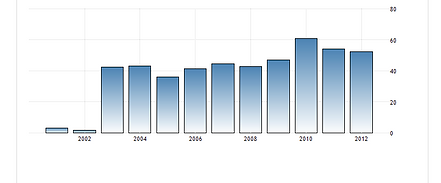

SINCE 2016
HAIR STYLES D.C
"Are all the rules, laws and regulations and all processes that are run by the government, which can affect or contribute to organizations."
VOTER PARTICIPATION RATES
According to “Institute for Democracy and Electoral Assistance” (IDEA), the table shows all the participants in parliamentary and presidential elections.
1. http://www.idea.int/vt/countryview.cfm?id=48


LEVEL OF DEFENSE EXPENDITURES
“Military expenditures data from SIPRI are derived from the NATO definition, which includes all current and capital expenditures on the armed forces, including peacekeeping forces; defense ministries and other government agencies engaged in defense projects; paramilitary forces, if these are judged to be trained and equipped for military operations; and military space activities.”
According to the world bank Colombia has a military expenditure of 3,5.

RUSSIAN - COLOMBIAN RELATIONSHIPS
According to “lainfo.es” the russian forign minister (Sergei Lavrov) and his colombian counterpart (Maria Angela Holguin) are trying to strengthen their trade relations. “We want to expand that market (Russian) and we can work together in different opportunities. We all all work done, but also the commitment of wanting to improve trade relations,” Affirms Maria Angela.
Thanks to this Colombia and Russia services companies and enterprises could benefit making exchanges of goods, products or services.
1. http://lainfo.es/en/2015/03/25/russia-and-colombia-interested-in-expanding-trade-relations/
POLITICAL CONDITIONS IN FOREIGN COUNTRIES
According to a publication of “El Dinero” the industry of services have an important place in the economy of Colombia because its represents more of the 50% of GDP and his external market increased 3,6% (2014) reaching US$7.424 millions.
As we can see the most export of services in Colombia is the travel services and tourism and its followed for transport.
1. http://www.dinero.com/economia/articulo/exportaciones-servicios-colombia/214572

CHANGES IN TAX LAWS
Since January 2015 companies operating in Colombia have been challenged to a new tax reform. It seems to be a negative issue for foreign companies but it is necessary to take a look deeply to realize the real impact on multinational companies.
This applies to all domestic companies and non-residents that hold wealth in Colombia equal to or exceeding 1 billion Colombian pesos (US$ 416,000) as of 1 January 2015.
It will rise progressively at a rate of:
-
1.15% for 2015.
-
1% for 2016.
-
0.4% for 2017.
These Colombian tax reforms could appear as an increased tax burden for all foreign companies. However, complexity to do business is focused on all Latin American countries and even Colombia having a complex fiscal model, is the less complex country in the region. Argentina is the most
complex country followed by Brazil in second place and Mexico as number six.
Colombia is still the easiest country in which to do business in Latin America according to the World Bank report 2014; it ranks 34 out of 189 economies around the world in that index, and was also the least complex country in the region according to our Global Benchmark Complexity Report.

LOBBYING ACTIVITIES
Lobbyists can influence government decisions and are part of the policy-making process in modern democracies. Lobbying can provide governments with valuable insights and data but it can also lead to unfair advantages for vested interests if the process is not transparent and carried out with integrity. Citizens interests are put at risk when negotiations are carried out behind closed doors.
http://www.oecd.org/gov/ethics/lobbying.htm
An article of the Semana Magazine said.
“COLOMBIA, REY DEL 'LOBBYING'
Colombia es uno de los países que más plata invierte en operaciones de lobbying en Estados Unidos, según un estudio de la Cepal. En los últimos tres años, Colombia ha pagado 116 millones de dólares a firmas especializadas en promoción de exportaciones, manejo de información y relaciones públicas de Washington, con el fin de defender sus mercados en Estados Unidos. Dicha cifra equivale al 26 por ciento de los gastos totales efectuados con el mismo fin por todos los países de América Latina. La Federación de Cafeteros fue uno de los más importantes compradores de este tipo de servicios en el período mencionado.”
http://www.semana.com/confidenciales/articulo/colombia-rey-del-lobbying/14541-3

NUMBER OF PATENTS
The Colombian Government has recently adopted new policies in order to develop the patent prosecution system in a most cost and efficient way. All efforts have been implemented to encourage local and foreign companies to apply for the protection of their IP rights, especially in patents the most significant and practical changes are the following.
http://www.clarkemodet.com/blog/2014/07/Patents-in-Colombia--Update.html#.VsFAEpPhCt9
The Superintendent of Industry and Trade Patent Database is a free search platform for Colombian patent records created by the the Superintendent of Industry and Trade for Colombia (who also created the Superintendent of Industry and Trade Design Database). The interface is in Spanish, so users should utilize a machine translation service (like Google Translate) to translate the interface into their language of choice.
The interface provides a single search form which allows users to enter search criteria into a number of fields:[1]
-
Record number and year
-
Words in title
-
Applicant/Attorney/Designer/Inventor name
-
Gazette number
-
Certificate number
-
Priority patent data (number and country)
-
IPC code
-
Access contract (availability, number, and entity)
Business procedures have been streamlined. With no minimum capital required, the cost of launching a business equals less than 10 percent of average annual income. Reforms are needed to improve labor flexibility and lower non-wage costs. In 2015, the government ended a middle-class mortgage subsidy program that had been aimed at boosting home construction but increased subsidies for low-income and middle-income urban housing.

LEVEL OF GOVERNMENT SUBSIDIES
Subsidies and other transfers (% of expense) in Colombia was last measured at 52.26 in 2012, according to the World Bank. Subsidies, grants, and other social benefits include all unrequited, nonrepayable transfers on current account to private and public enterprises; grants to foreign governments, international organizations, and other government units; and social security, social assistance benefits, and employer social benefits in cash and in kind. This page has the latest recorded value, an historical data chart and related indicators for Subsidies and other transfers (% of expense) in Colombia.
LOCATION AND SEVERITY OF TERRORIST ACTIVITIES
According to “Institute for economics and peace” and his report of “2015 Global Terrorism Index” published on November of 2015, Colombia ranked the 17 with a punctuation of 6.662.
On the other hand the magazine “El Colombiano” said that although the government is trying to conclude the peace process with “FARC (Fuerzas Armadas Revolucionarias de Colombia)” the terrorism in Colombia still because FARC is not only the revolutionary group of the country, the “ELN”, “M-19” and other are continue to make terrorism in the country.
About the criteria of the report who give this qualification to Colombia includes the number of terrorist attacks, injuries, fatalities and property damage. And the one who most affected Colombia was the terrorist attacks being of levels of states like Nepal, Russia and Bangladesh (worst ranked)
1. http://economicsandpeace.org/wp-content/uploads/2015/11/2015-Global-Terrorism-Index-Report.pdf
2. http://www.elcolombiano.com/en-terrorismo-colombia-esta-entre-los-20-peores-del-mundo-LM842793

LEGISLATION AND EQUAL EMPLOYMENT
All these articles in the Constitution speak of the equality of all the people to choose a profession or occupation which should generate quity in companies to choose empledos .
Article 13. All persons are born free and equal before the law and entitled to equal protection and treatment by the authorities and enjoy the same rights, freedoms and opportunities without any discrimination on grounds of sex, race, national or family origin, language, religion, political or philosophical opinion.
Article 25. Work is a right and a social obligation and enjoys, in all its forms, special state protection. Everyone is entitled to a job under decent and fair conditions.
Article 26. Everyone is free to choose a profession or occupation. The law may require certificates of competence. The competent authorities shall inspect and supervise the exercise of professions. Occupations, arts and crafts that do not require academic training are to be freely exercised, except those involving social risk.
Legally recognized professions may be organized in schools. The internal structure and operation of these must be democratic. The law may assign public functions and establish the appropriate controls.
ENVIRONMENTAL PROTECTION LAWS
According to The Environmental Information System of Colombia (SIAC), since 1991, Colombia has been protecting the environment through articles in the Colombian Political constitution in terms of management and conservation of natural resources.
This affect directly our industry because despite of the different resources that can be used to create items, there are some laws contain in the articles 79 and 80 which prohibit the use of certain king of material for manufacturing business, that means that in the future we cannot buy some technology and innovating umbrellas for our business if they are made with material that is not accepted by the Colombian Government.
Political, Governmental and Legal Forces Introduction was Developed Based on : David, F. (2011).
Strategic Management: Concept & Cases (15th ed.pp 68-69).
Florence, United States : Pearson
GOVERNMENT FISCAL AND MONETARY POLICY CHANGES
Government fiscal policy refers to the set of strategies that the government implements, not justfor generating resource and incomes, but also for a correct management of the public incomes, expenses and budgets in order to control and maintain economic stability and growth. On the other hand, monetary policies are a set of strategies and decisions established by monetary organisms with the purpose of stabilizing money value, influencing on interests rates and inflation.
According to the International Monetary Fund, last year fiscal and monetary policies were mildly supportive on the development of economic growth, having a 4.6% of economic growth. Nevertheless,
Staff projects growth to slow to 3.4 percent in 2015 and gradually rise toward its potential (around 4¼ percent) over the medium-term supported by the government’s infrastructure program and a gradual recovery in oil prices and external demand. Risks are mainly on the downside, including higher interest rates and financial volatility, a protracted period of slower economic growth, and a delayed implementation of the infrastructure program. Additionally, in order to reduce the economic growth gap, an increase economic growth The “Banco de la República” has imposed a 4.5 % of intervention interest rates to reduce inflation; besides, the government is also thinking to develop a new tax reform in 2015 or 2016. Colombia´s economic forecasts and possible fiscal and monetary policies can generate disadvantages for domestic cleaning services, because increasing taxes will reduce people´s desire for investment on different businesses and also it will reduce people´s spending capacity, and decrease the demand of housekeeping services.
Taken from:
-
Política monetaria. (2010, June 12). Retrieved August 16, 2015, from http://www.gerencie.com/politica-monetaria.html
-
Política Fiscal. (2010, June 12). Retrieved August 16, 2015, from http://www.gerencie.com/politica-fiscal.html
-
Junta Directiva del Banco de la República mantiene la tasa de interés de intervención en 4,5%. (2015, August 21). Retrieved August 16, 2015, from http://www.banrep.gov.co/es/comunicado-21-08-2015
-
Política Monetaria: La estrategia de inflación objetivo en Colombia. (2013.). Retrieved August 16, 2015, from http://www.banrep.gov.co/es/politica-monetaria
-
Correa, L. (2015, January 4). Política fiscal y desarrollo. El Espectador, p. 1. Retrieved August 16, 2015, from http://www.elespectador.com/opinion/politica-fiscal-y-desarrollo-columna-536202
-
Restrepo, J. (2015, January 28). Juan Camilo Restrepo. Portafolio, p. 1. Retrieved August 16, 2015, from http://www.larepublica.co/¿para-donde-va-la-política-fiscal-en-2015_213756